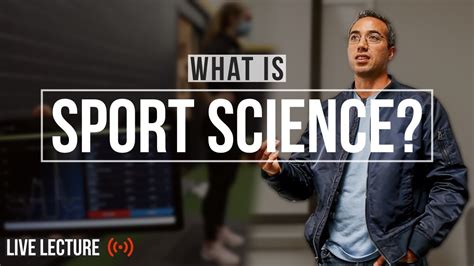Sports science has become an integral part of the athletic world, with its focus on enhancing performance, preventing injuries, and optimizing overall well-being. In the United States, top universities have recognized the value of sports science and offer comprehensive programs to prepare students for careers in this field. From biomechanics to nutrition, exercise physiology to sports psychology, and everything in between, these programs cover a wide range of disciplines aimed at improving athletic performance. In this blog post, we will delve into the world of sports science, exploring the various facets of these programs offered at the top US universities. We will discuss the role of sports science in performance enhancement, the curriculum of these programs, and the impact they have on elite athletes’ performance. Stay tuned as we uncover the science behind sports and the contributions of US universities in this dynamic field.
Table of Contents
Role of Sports Science in Performance Enhancement
Sports science plays a crucial role in the performance enhancement of athletes across various sports. Through the application of scientific principles and methodologies, sports science professionals work to optimize the physiological and psychological factors that contribute to athletic performance.
Exercise physiology is a key component of sports science, focusing on how the body responds and adapts to physical activity. Understanding the physiological demands of different sports and designing tailored training programs can significantly improve an athlete’s overall performance.
Sports psychology is another vital aspect of sports science, as mental performance is equally important as physical prowess in sports. By working with athletes to develop mental toughness, confidence, focus, and resilience, sports psychologists can help enhance their performance on the field or court.
Furthermore, the impact of sports science research and innovation cannot be overlooked. Ongoing research in areas such as biomechanics, nutrition, recovery techniques, and sports technology continuously contributes to the development of new strategies and tools for performance enhancement.
Top US Universities Offering Sports Science Programs
Many aspiring students who are passionate about sports and interested in the science behind athletic performance are often on the lookout for top universities offering sports science programs in the United States. Fortunately, there are several prestigious institutions in the US that provide outstanding education and research opportunities in the field of sports science.
One of the leading universities in the US known for its sports science programs is Stanford University. Stanford offers a comprehensive undergraduate program in Human Biology with a concentration in Sports Science. The program provides students with a solid foundation in the biological and social aspects of human movement and sports performance, preparing them for a variety of careers in sports science and related fields.
Another top-notch institution offering sports science programs is the University of Michigan. The Department of Movement Science at the University of Michigan provides students with a strong background in exercise physiology, biomechanics, and motor control, allowing them to gain a deep understanding of the scientific principles behind human movement and athletic performance.
Furthermore, the University of Florida is also renowned for its sports science programs, particularly in the area of sports psychology. The university’s College of Health and Human Performance offers a top-ranked graduate program in Sport and Exercise Psychology, providing students with the knowledge and skills to enhance mental performance and well-being in athletic and exercise settings.
Curriculum of Sports Science Programs
When pursuing a degree in sports science, it is important to understand the curriculum of the program in order to ensure that it aligns with your career goals. The curriculum of sports science programs typically includes a combination of theoretical knowledge and hands-on practical experience. Students can expect to study a range of subjects including anatomy, physiology, exercise physiology, biomechanics, nutrition, psychology, sports management, and research methods.
Additionally, students may have the opportunity to specialize in a particular area of sports science such as sports medicine, strength and conditioning, or sports performance. This allows students to tailor their education to their specific interests and career aspirations, providing them with the necessary skills and knowledge to excel in their chosen field.
Furthermore, many sports science programs also incorporate opportunities for internships, placements, and practical projects, giving students the chance to gain real-world experience and apply their learning in a professional setting. This hands-on experience is invaluable in preparing students for the demands of the sports industry and can help them to stand out in the job market.
Overall, the curriculum of sports science programs is designed to provide students with a well-rounded education that encompasses the multidisciplinary nature of sports science. By covering a wide range of subjects and offering opportunities for specialization and practical experience, these programs equip students with the knowledge and skills needed to pursue successful careers in the sports industry.
The Importance of Biomechanics in Sports Science
Biomechanics plays a crucial role in the field of sports science, as it focuses on the mechanical aspects of human movement during physical activity. Understanding the biomechanics of sports not only enhances athletic performance but also helps in preventing and rehabilitating sports-related injuries.
By analyzing the forces and motions involved in various sports activities, biomechanics provides valuable insights into optimizing technique and equipment design. It helps in identifying the most efficient movement patterns, reducing the risk of overuse injuries, and improving overall performance.
Furthermore, biomechanical analysis is instrumental in enhancing sports equipment such as footwear, clothing, and protective gear. This ensures that athletes have access to the most advanced and appropriate gear for their specific sports, which can significantly impact their performance and reduce the likelihood of injuries.
In conclusion, the importance of biomechanics in sports science cannot be overstated. It is a critical component in maximizing athletic potential, preventing injuries, and continually improving the overall landscape of sports performance.
Nutrition and Exercise Physiology in Sports Science
Nutrition and exercise physiology play a crucial role in the field of sports science. Proper nutrition and understanding the physiological effects of exercise are essential for improving athletic performance and overall health. In the realm of sports science, nutrition refers to the study of the relationship between food and drink consumption and an athlete’s performance, while exercise physiology involves the study of the acute responses and chronic adaptations to different types of exercise.
When it comes to nutrition, athletes need to consume a well-balanced diet that provides the necessary nutrients to support their physical activity and promote recovery. Carbohydrates, proteins, fats, vitamins, and minerals are all vital components of a proper sports nutrition plan. Understanding the role of each of these nutrients in energy production, muscle repair, and overall health is essential for athletic success.
Exercise physiology, on the other hand, focuses on how the body responds to physical activity. This includes the study of cardiovascular, respiratory, and muscular systems during exercise, as well as the mechanisms behind training adaptations and performance enhancement. Sports scientists utilize this knowledge to design personalized training programs that optimize an athlete’s physiological response to exercise, leading to improved endurance, strength, and speed.
In conclusion, the integration of nutrition and exercise physiology in sports science is paramount for athletic success. By understanding the importance of proper nutrition and exercise on the body’s physiological processes, athletes can achieve their peak performance and overall well-being.
Sports Psychology: Enhancing Mental Performance
Sports psychology plays a crucial role in enhancing the mental performance of athletes. It focuses on the psychological factors that influence an athlete’s performance, such as motivation, confidence, concentration, and the ability to handle pressure. By addressing these mental aspects, sports psychologists can help athletes optimize their performance and achieve their full potential.
Mental performance is essential for athletes to succeed in sports. Sports psychologists work with athletes to develop mental skills and strategies that can improve their performance on the field or court. These strategies may include visualization, goal-setting, and relaxation techniques to help athletes manage stress and anxiety. By enhancing mental performance, athletes can perform at their best when it matters most.
Furthermore, sports psychology is not just for professional athletes. It can also benefit amateur and recreational athletes who want to improve their performance and enjoyment of sports. By working with a sports psychologist, athletes at all levels can learn to overcome mental barriers and develop the mental toughness needed to excel in their chosen sport.
Overall, sports psychology plays a vital role in enhancing the mental performance of athletes, regardless of their skill level or sport. By addressing the psychological factors that influence performance and providing athletes with the necessary mental skills and strategies, sports psychologists can help athletes achieve their full potential and perform at their best.
Understanding Sports Injuries and Rehabilitation
Sports injuries are a common occurrence in the world of athletics, with athletes often pushing their bodies to the limit in pursuit of excellence. Understanding the mechanisms behind these injuries is crucial in order to develop effective rehabilitation strategies.
Sports injuries can range from minor sprains and strains to more severe fractures and dislocations. It is important for athletes and sports science professionals to have a comprehensive understanding of the types of injuries that can occur, as well as the circumstances that may lead to them. This knowledge is essential for preventing injuries and minimizing the risk of re-injury.
Rehabilitation is a critical component of the recovery process for athletes who have sustained sports injuries. Rehabilitation programs are designed to not only help athletes regain their physical abilities, but also to address any psychological impacts of the injury. Sports science professionals play a key role in developing and implementing these programs, tailoring them to the specific needs of each athlete.
Understanding the intricacies of sports injuries and rehabilitation is essential for athletes and sports science professionals alike. By taking a proactive approach to injury prevention and implementing effective rehabilitation strategies, athletes can minimize the impact of injuries on their performance and overall well-being.
Sports Technology and Performance Analysis
In the field of sports science, sports technology plays a crucial role in performance analysis. With the advancement of technology, sports teams and athletes now have access to cutting-edge tools and equipment that can provide in-depth insights into their performance. From wearable devices to high-speed cameras, sports technology has revolutionized the way performance is measured and analyzed in various sports.
One of the key aspects of sports technology is performance analysis. Coaches and sports scientists use data from various technological tools to assess an athlete’s performance during training and competition. This data can include metrics such as speed, power, agility, and biomechanical movements. By analyzing this data, coaches can identify areas for improvement and tailor training programs to enhance an athlete’s performance.
Furthermore, sports technology has also led to the development of innovative performance analysis software. These software programs can process large amounts of data and provide visual representations of an athlete’s performance. Coaches and analysts can use this information to make evidence-based decisions and adjustments to training strategies, ultimately leading to improved performance on the field.
Overall, the integration of sports technology and performance analysis has significantly impacted the way athletes and teams approach training and performance improvement. With the continued advancements in technology, the future of sports science looks promising, with even more sophisticated tools and methods for performance analysis.
Sports Science Research and Innovation in US Universities
Sports science research and innovation in US universities play a crucial role in shaping the future of athletic performance and well-being. Through cutting-edge studies, experiments, and technological advancements, these institutions are at the forefront of revolutionizing the way we understand and improve human physical abilities.
One of the key areas of focus in sports science research is biomechanics, which explores the mechanical aspects of human movement to enhance athletic performance and prevent injuries. Universities such as Stanford, University of Michigan, and University of North Carolina have dedicated departments and research facilities to delve deep into this field, developing state-of-the-art equipment and techniques.
Another vital aspect of sports science research is exercise physiology, which investigates the body’s responses and adaptions to physical activity. Institutions like UCLA, University of Florida, and Texas A&M University are conducting groundbreaking studies to optimize athletic training programs and improve overall fitness levels.
Furthermore, the integration of sports technology in research and innovation at universities like MIT, Purdue, and University of Illinois Urbana-Champaign is facilitating advanced performance analysis, injury prevention, and rehabilitation. These advancements are not only benefitting elite athletes but also trickling down to the general public, promoting a healthier and more active lifestyle.
Impact of Sports Science on Elite Athletes’ Performance
Sports science has revolutionized the way elite athletes train and perform, enhancing their overall performance and results. Through the implementation of advanced training methodologies, biomechanical analysis, nutrition and exercise physiology, and sports psychology, sports science has played a crucial role in maximizing the potential of elite athletes.
By integrating biomechanics into training programs, coaches and athletes can analyze movement patterns, identify inefficiencies, and create tailored training plans to optimize performance and reduce the risk of injury. Incorporating nutrition and exercise physiology allows athletes to fuel their bodies effectively and recover efficiently, leading to improved physical performance and overall health.
Furthermore, sports psychology techniques such as mental imagery, focus control, and goal setting have been proven to enhance mental performance, increase confidence, and optimize overall athletic potential. The use of sports technology and performance analysis tools further allows for the tracking and assessment of an athlete’s performance, providing valuable insights for training program adjustments and performance enhancement.
Research and innovation in sports science continue to push the boundaries of athletic performance, allowing elite athletes to reach new heights and achieve extraordinary results. As the field of sports science continues to evolve, its impact on elite athletes’ performance is undeniable, ushering in a new era of athletic achievement.






